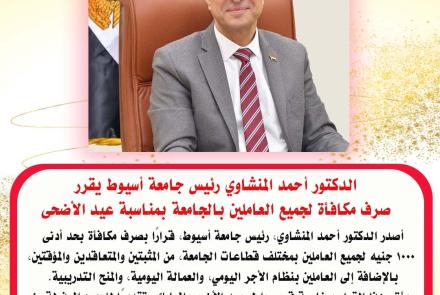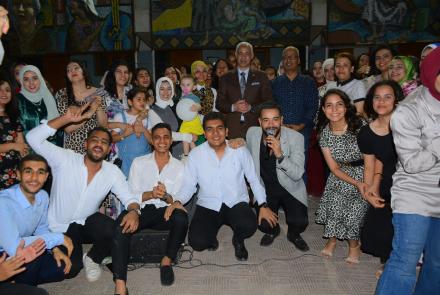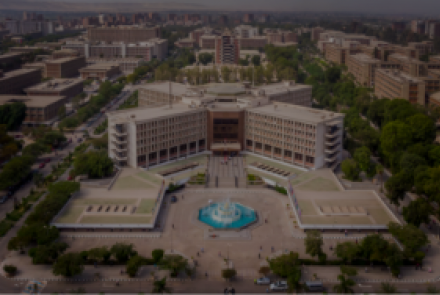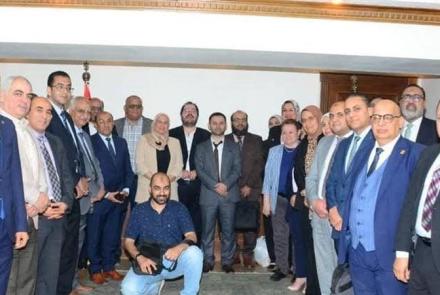Under the supervision of Dr. Ahmed El-Minshawy, president of Assiut University, a delegation of university professors participated in a workshop entitled "Russian-Egyptian scientific dialogue amid a new international dynamic", which was organized by the Academy of scientific research and Technology in cooperation with the Institute of Oriental Studies of the Russian Academy of Sciences and the Primakov Russian Center for international cooperation, under the supervision of Dr. Gina Sami El-Feki, acting president of the Academy of scientific research and technology, at the Academy's headquarters.
Dr. Ahmed El-Minshawy stressed that the University's participation in the workshop "Russian-Egyptian Scientific Dialogue amid a New International Dynamic" comes within the framework of the University's keenness to strengthen international cooperation in the fields of scientific research, technology, and innovation, especially with countries with strategic relations with Russia.
The president of Assiut University added that this participation reflects the University's commitment to be an active part in global scientific dialogues, especially in light of Egypt's and Russia's membership in the BRICS+ group, pointing out that the workshop represents an important opportunity to explore new cooperation mechanisms, areas of joint financing, and meet challenges in vital sectors such as energy, medicine, agriculture, computer science, and water, in a way that serves sustainable development and keeps pace with the accelerating international changes.
The workshop aimed at enhancing scientific and technological cooperation between Egypt and Russia, especially in light of their membership in the BRICS+ group, where they discussed ways to develop cooperation mechanisms, explore available funding opportunities, and identify strategic priorities in the fields of science, technology, research, and innovation. She also addressed the most important challenges facing this cooperation in vital sectors such as energy, medicine, computer science, agriculture, and Water Research.
The University delegation participating in the workshop included: Dr. Adel Abdo Hussein, dean of the Faculty of sugar industry technology and integrated industries, Dr. Atef Al-Naqib, undersecretary of the Institute of Materials Science and Nanotechnology, coordinator of relations between Assiut University and Russian universities, coordinator of Assiut University in the BRICS Universities Network, and Dr. Saleh Mahmoud Ismail, head of the Land Department at the Faculty of Agriculture.
The workshop activities included the participation of (25) a scientist and researchers from experts and faculty members from Egyptian and Russian institutions and universities. It included two main sessions, the first dealt with the" Russian - Egyptian scientific dialogue, strengthening cooperation in the field of medicine (pharmaceutical industries) and energy", and the second discussed the"Russian-Egyptian scientific dialogue, strengthening cooperation in Computer Science (digital technologies) and Water Research".
During the workshop, Dr. Adel Abdo presented the possible aspects of cooperation between the two sides in the fields of Applied Research, especially in the interdisciplinarity characterized by the Faculty of sugar industry technology and integrated industries. He pointed to the possibility of cooperation in conducting research necessary to produce industries that can be exported abroad or used inside Egypt.
Dr. Atef Al-Naqib spoke about the importance of joint graduate programs, such as the Master of Materials Science and Nanotechnology, as well as the exchange of faculty members in the form of short scientific missions, and hosting young researchers at Russian universities.
Dr. Saleh Mahmoud Ismail discussed several topics, including the efficiency of water use in the agricultural sector, and cooperation in the field of smart systems that are used in various areas in the desert of Egypt.
For his side, the Russian side welcomed the proposals made by the Assiut University delegation, stressing the importance of continuing this constructive scientific dialogue. He also pledged to organize more meetings and joint events, both in Egypt and Russia, in addition to holding virtual meetings between the two sides to discuss areas of cooperation and develop a clear strategy to strengthen it, calling on Egyptian and Russian universities to expand the circle of effective and fruitful participation in this framework.

 Do you have any questions?
Do you have any questions? 





